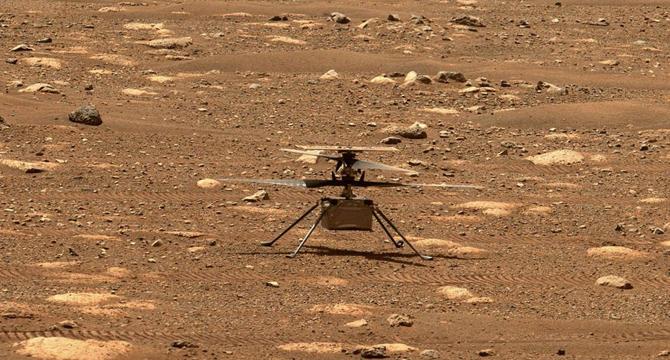Livescience
1w
29

Image Credit: Livescience
After accident crash on Mars, NASA's Ingenuity helicopter could live on as a weather station for 20 years
- NASA's Jet Propulsion Laboratory gave an update about Mars helicopter Ingenuity during the annual meeting of the American Geophysical Union on 11th Dec. Despite Ingenuity's hard landing on Mars, 72 avionics battery sensors have all been functional, and it is going to continue on as a weather station to record telemetry, take images, and on-board data storage. Ingenuity could serve as a weather station for about 20 years, but there may be no way to get that data back to Earth. Aside from the rotor damage, the helicopter remains otherwise in good health. The design conceptual of a new helicopter, known as Mars Chopper, is planned, projected to be 20 times heavier than Ingenuity, and could carry a few pounds of science equipment.
- Ingenuity, attached to the Perseverance rover, began a test flight campaign to prove that powered flight in the thin Martian atmosphere was possible, crashed and suffered rotor damage that rendered it incapable of ever flying again.
- JPL had spent months investigating Ingenuity's crash and found that the helicopter's navigation systems had too little information to go with due to the monotone, bland texture of the Martian surface.
- However, JPL scientists added that Ingenuity remains in otherwise good health. In fact, if you were to ask the helicopter itself, Ingenuity would report that everything is fine.
- "If you were to query Ingenuity's health system, she's green across the board as far as she's concerned. She doesn't have a sensor on the rotor system to detect the damage."
- The design is still conceptual and does not have a timeline for reaching Mars, but JPL is envisioning a six-rotor concept that is 20 times heavier than Ingenuity and could autonomously explore remote locations.
- Ingenuity's mission managers look forward continuing Ingenuity's second life on the Red Planet as a weather station.
- The Perseverance rover, which Ingenuity could communicate with, is now 1.8 miles (3 km) away from the helicopter. Soon, Ingenuity might lose its ability to communicate with its human controllers on Earth.
- "I think it's a good bet that, within the next month, we'll lose contact forever, or until we come back in 20 years with astronauts, or until we turn back for sample return," Tzanetos said.
- JPL is looking to the future of powered flight on Mars and presented a six-rotor concept known as Mars Chopper during the presentation.
Read Full Article
1 Like
For uninterrupted reading, download the app